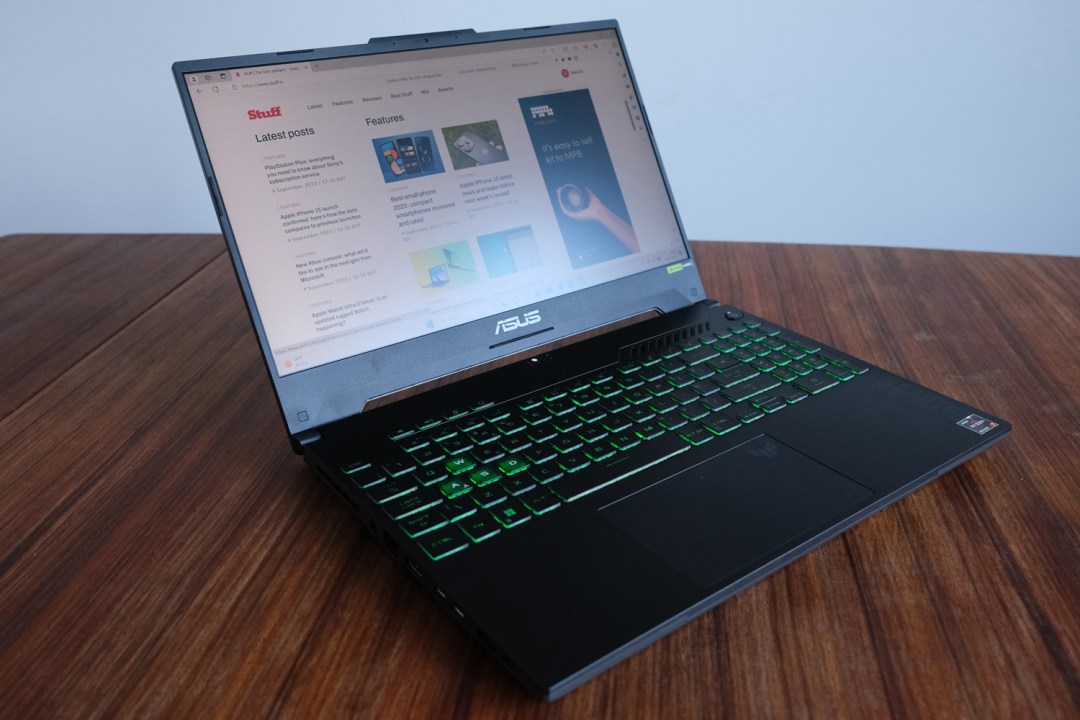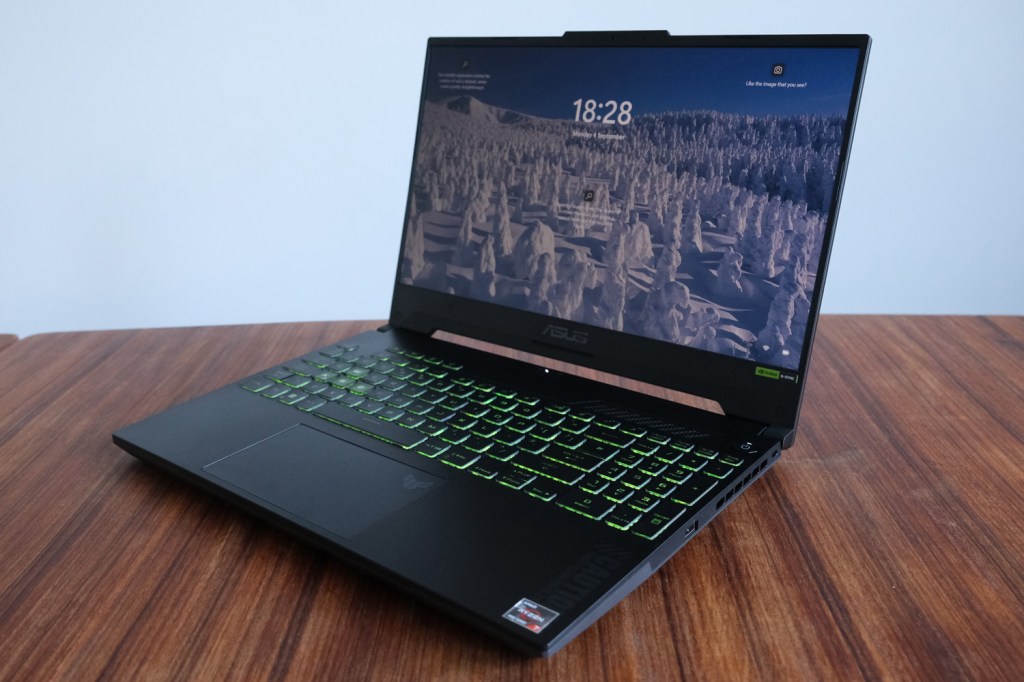Asus TUF Gaming A15 review: value player
A mainstream machine with plenty of gaming grunt

Stuff Verdict
Fantastic performance from gamer-friendly hardware that manages to stay on the right side of affordable. The TUF Gaming A15 also fares just as well for daily duties.
Pros
- Great 1080p gaming performance
- Very respectable battery life
- Crisp high refresh rate screen
Cons
- Intel internals fare better at certain workloads
- Not everyone will like the ‘tough’ design
Introduction
Convincing whoever’s footing the bill that you ‘need’ a gaming laptop for back-to-school season can be a tricky conversation at the best of times – but we bet it’s even more of a challenge now a new generation of GPUs has pushed prices to stratospheric levels. And even if you have the cash to buy one yourself, manufacturers are more focused on beefy desktop replacements rather than portable all-rounders. Thankfully Asus is here to help, with the TUF Gaming A15.
This sensibly-sized, more mainstream machine promises military-grade strength, so should have no issues being thrown in a backpack, and has efficient enough hardware to last all day away from the mains. It’s also packing an Nvidia RTX 4060 GPU, which should have enough gaming grunt to play even the latest titles at 1080p, and best of all arrives with a price that’s surprisingly wallet-friendly. Does that make it a more entertaining educational upgrade than a stack of textbooks? You betcha.
How we test laptops
Every laptop reviewed on Stuff is tested using industry standard benchmarks and apps to assess performance and battery life. We use our years of experience to judge display, sound and general usability. Manufacturers have no visibility on reviews before they appear online, and we never accept payment to feature products.
Find out more about how we test and rate products.
Design & build: TUF guy



It might not be as ultra-rugged as a Panasonic Toughbook, but the TUF Gaming A15’s stamped steel looks aren’t entirely just for show. Asus reckons it was tested to survive shocks, drops, humidity and extreme temperatures, so should comfortably cope with the rigours of daily desktop life. It certainly feels sturdy enough, with very little flex and a keyboard tray that only dips under considerable force.
We think the Gundam-style graphics on the wrist rest declaring this a “high frame rate zone” are a little cheesy, but at least they’re subtle. That’s also true of the X-shaped power, sleep and charging indicator LEDs, which can be seen even when the lid is closed. Neither the gunmetal grey finish nor the TUF logo on the lid mark it out as a gaming laptop, so it’s well suited to going incognito as a work machine. At 2.2kg this isn’t an especially heavyweight notebook, either, so should be ideal for taking on the move.
Connectivity is almost exclusively found on the left side of the machine, with two USB-C ports, one USB-A, an HDMI 2.1 output, 3.5mm headset port and an Ethernet port. This is also where you’ll find the barrel port for the proprietary power brick: one of the USB-C ports can be used to charge the laptop, but not quickly enough for gaming. There’s just a single USB-A port on the right side, which most gamers will probably want for their mouse.
The 720p webcam built into the bezel is functional at best. Wannabe Twitch stars aren’t going to want to use it to stream themselves to the world, but it’ll do in a pinch for video calls. It doesn’t support Windows Hello biometrics, and there’s no fingerprint sensor either, so it’ll be PINs and passwords all the way.
Performance & battery life: get your game on



It might not look like a gaming laptop then, but one glimpse at the spec sheet says otherwise. The TUF Gaming A15 is packing a GeForce RTX 4060, with 8GB of dedicated video memory and a 140W power limit. It’s also backed up by Nvidia’s Optimus tech for seamless switching back to the onboard GPU when you aren’t getting your game on.
This mid-range chip is perfectly picked to cope with 1080p gaming, either natively or upscaled using DLSS. We used the Balanced preset to get Cyberpunk 2077 running at 62fps at its highest settings with ray tracing enabled, while Ghostwire Tokyo managed 59fps without any DLSS assistance. Redfall also delivered a perfectly playable 60fps average. Doom Eternal scored even more impressive 90fps with some tweaking, while esports titles and games without ray tracing are no problem at all. Counter Strike Global Offensive was regularly north of 300fps.
Even better, the TUF Gaming A15 isn’t offensively loud while gaming – at least when using the Performance power profile. Turbo kicks the internal fans into high gear though, at which point you’re going to want to play with headphones on. The cooling vent on the right side also pump hot air directly over your mouse hand, and the top of the chassis gets rather toasty to the touch.
Desktop performance comes via an 8-core, 16-thread AMD Ryzen 7 7735HS processor, paired with 16GB of RAM. This is a moderately quick chip that can handle most tasks without much fuss. While the 12th-gen Intel CPUs powering the similarly-priced MSI Cyborg 15 and Acer Nitro 5 are a fair bit faster in certain tasks, you’re unlikely to notice in daily use. Creative pros might want to consider the alternatives, but almost everyone else will find plenty of performance here.
On the plus side, the AMD silicon is particularly efficient. With a video on looping playback it comfortably managed over nine hours, which is up there with the best 15in gaming machines. It even outpaces some ultraportables, which is mighty impressive. Naturally gaming will massively dent that figure, but abstain during the day and you shouldn’t need to bring the power brick with you when travelling away from home.
The 512GB of NVMe storage feels a little miserly, even at this price. New games like Starfield demand 100GB or more, which will quickly eat into your remaining total. Happily there’s a second M2 slot for adding extra capacity later. It’s easy enough to get to, just by removing a couple of screws at the rear.
Screen & sound: speed demon



Depending on where you live you might be able to snag a TUF Gaming A15 with a 2560×1440 resolution, 165Hz refresh rate display – but in the UK you’re limited to a 1920×1080, 144Hz IPS panel. Either way it comes with Nvidia’s G-Sync adaptive refresh tech, which is a very welcome inclusion, as it helps deliver stutter-free gameplay even at sub-60fps performance.
The 15.6in panel has a 16:9 aspect ratio, which is great for most video content but a little vertically constricted compared to the current crop of 16in, 16:10 aspect machines now doing the rounds. The bezel is nice and slim at the sides, at least, and the matte finish helps keep unwanted light reflections in check.
This doesn’t have the most impactful colours we’ve seen on a mainstream gaming laptop, but they are at least fairly accurate, and black levels are decent enough given the LCD backlight tech. Contrast is pretty good too, so if you play in a dimly-lit room games will still have plenty of punch. Brightness is merely OK, though. You’re going to struggle to make out shadow details when playing under direct sunlight. There’s also no HDR support, which shouldn’t come as a shock at this price.
The Atmos-approved stereo speakers are a great pairing to the display, getting plenty loud enough for solo gaming. They produce a reasonable amount of low-end oomph, making explosions and bullets pleasingly impactful, but you’ll still want headphones for accurate positional sound in multiplayer matches. The speakers can be a little harsh on high-end frequencies, so are best dialled down a notch or two for movies and music.
Keyboard & touchpad: the write stuff



Asus knows most TUF Gaming A15 owners are going to do more than play games, so has sensibly squeezed in a numerical keypad next to the QWERTY keyboard. It uses half-width keys, but that’s hardly a deal-breaker given this is a 15in machine, not a 17in or larger desktop replacement.
The cursor and function keys are half-height, but that never slowed us down; the US-style shift and enter keys too a bit more getting used to, though. We like that the volume, mute and power buttons sitting separately, making them almost impossible to hit by accident while gaming. The whole thing is RGB backlit, with semi-transparent key caps to let the light shine through and Asus’ Armory Crate software for picking from a bunch of basic presets. There’s no per-key customisation, though.
You don’t get mechanical key switches here (those are reserved for Asus’ much pricier gaming models) but there’s otherwise nothing to gripe about. Each key has a decent amount of travel, fairly springy action and good bounce-backability if you type with enough force to bottom out with every press. And unlike a mechanical keyboard, this is quiet enough that you won’t get thrown out of the campus library simply for typing up your lecture notes.
The single-piece touchpad isn’t gigantic, but has a smooth enough surface for friction-free finger gliding, and always detected multi-touch gestures correctly. Clicks are even quieter than the keyboard, and Asus has sensibly set one of the function keys to quickly disable it; almost anyone wanting to game on this thing will immediately plug in a mouse.
Asus TUF Gaming A15 verdict

The TUF Gaming A15 isn’t the fastest 15in gaming laptop money can buy, and its Ryzen CPU isn’t going to break any performance records either – but considering the asking price, you’re getting a serious amount of bang for very little buck. It plays even newer titles very well at 1080p, and Nvidia’s DLSS tech should guarantee it copes with upcoming releases too.
Elsewhere you get a decent enough display, all-day battery life (if you stick to the Windows desktop, that is), and a healthy number of ports. ‘Military standard’ toughness ratings aside, it should still be better equipped for life on the road than rival laptops, too.
Unless your budget stretches much, much further, you won’t see a huge performance uplift by shopping elsewhere. Ultimately, it’s hard to argue with the sheer value on offer here.
Stuff Says…
Fantastic performance from gamer-friendly hardware that manages to stay on the right side of affordable. The TUF Gaming A15 also fares just as well for daily duties.
Pros
Great 1080p gaming performance
Very respectable battery life
Crisp high refresh rate screen
Cons
Intel internals fare better at certain workloads
Not everyone will like the ‘tough’ design
Asus TUF Gaming A15 technical specifications
| Screen | 15.6in, 1920×1080 IPS LCD w/ 144Hz |
| CPU | AMD Ryzen 7 7735HS |
| Memory | 16GB RAM |
| Graphics | Nvidia GeForce RTX 4060 |
| Storage | 512GB NVMe SSD |
| Operating system | Windows 11 |
| Battery | 90Whrs |
| Dimensions | 354x251x22.4~24.9mm, 2.2kg |



